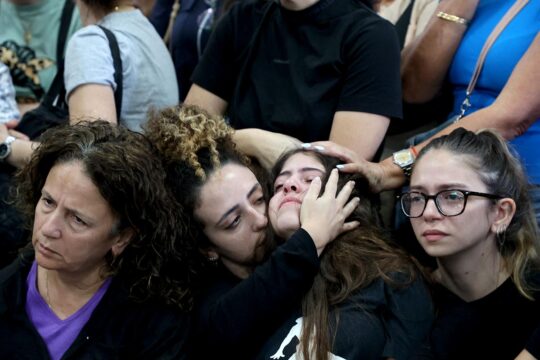The ambassadors, who included Germany's envoy, warned that policies targeting Bedouin communities could create a "coercive environment" forcing them to leave their areas.
Such a scenario could result in forcible transfers, "which are considered a grave breach of international humanitarian law", they said.
In a joint letter to Major General Yoav Mordechai, head of the military body that coordinates Israeli activities in the West Bank and Gaza, the ambassadors said the confiscated caravans and materials had cost $64,500.
"It is a serious concern that humanitarian assistance which is delivered under humanitarian principles be confiscated," they said.
As occupying power, they said, Israel is required to meet the basic needs of the population.
"Relief items should not be requisitioned, confiscated, expropriated or interfered with," they said.
The caravans had been used as homes and a kindergarten by the Bedouin communities of Sateh Al-Bahir and Jabal Al-Baba, east of Jerusalem, which the diplomats said are among the most vulnerable in the West Bank.
The signatories were the ambassadors of Germany, Spain, Italy, Sweden, Switzerland, Belgium, Ireland and Norway.
The letter, dated July 7 but seen by AFP on Tuesday, comes amid increased tension over Israel's demolition of foreign-funded structures for Palestinians in the West Bank.
Earlier this year, the United Nations said Israel was demolishing Palestinian homes and other buildings constructed with international aid at an "alarming" rate.
Mordechai's department, known as COGAT, referred questions to Israel's foreign ministry, which accused international donors of interfering.
"Israel has a rule of law. Israel can't accept illegal construction, be it by local elements or funded or aided by foreign elements," the foreign ministry said in a statement to AFP.
Under the 1990s Oslo peace accords, the Palestinian West Bank is divided into three areas.
Area C, which accounts for about 60 percent of the territory, is under full Israeli control and it is nearly impossible for Palestinians to obtain building permits there, UN officials say.
So far in 2016, Israel has demolished 190 structures funded partly or fully by international donors in the West Bank and east Jerusalem, nearly double the 108 from all of 2015, according to UN figures seen by AFP.
Israel argues that construction of shelters by donors in Area C is interference in its affairs.
European diplomats argue that Israel has failed to abide by its legal obligations to Palestinians.



